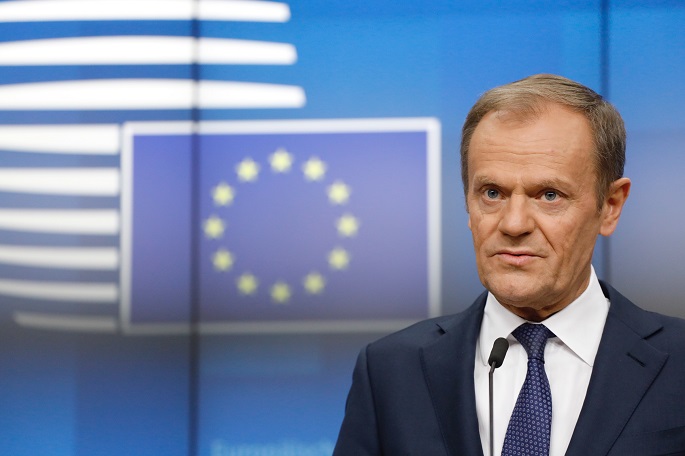EU grants Brexit extension until end of October
Published : 11 Apr 2019, 03:23
Updated : 11 Apr 2019, 20:06
The European Council agreed to a six-month extension of the Brexit process here early on Thursday morning, setting a new deadline for the United Kingdom to leave the European Union on Oct. 31, 2019, and narrowly avoiding a no-deal scenario that had been scheduled for April 12.
In an emergency European Council meeting that began Wednesday evening, British Prime Minister Theresa May formally requested a second short extension of the Article 50 procedures, already extended once past the original date of March 29, 2019, until the end of June. May requested more time to seek approval in the British House of Commons for the Withdrawal Agreement.
European Council President Donald Tusk said at a press conference early Thursday morning at the end of the summit meeting that this "flexible extension" will put "the course of action entirely in the UK's hands." The UK "can still ratify the Withdrawal Agreement, in which case the extension will be terminated. It can also reconsider the whole Brexit strategy," he said.
Tusk stressed, however, that the European Council decision left no room for changes to the Withdrawal Agreement, which had been previously negotiated by the UK and the EU. Approval by the UK's lawmakers is the only hurdle the agreement has yet to clear.
Until the end of the new extension period, "the UK will also have the possibility to revoke Article 50 and cancel Brexit altogether," the European Council president said, keeping hopes alive that the withdrawal process might be reversed.
Pleading with the UK to take action, Tusk concluded by "a message to our British friends: this extension is as flexible as I expected, and a little bit shorter than I expected, but it's still enough to find the best possible solution. Please do not waste this time."
EUROPEAN UNITY UNDER STRESS
The results of the emergency European Council meeting showed that unity among the 27 EU member states -- without Britain -- has remained intact, but not without signs of stress from the difficult divorce proceedings and prolonged uncertainty.
The European Council unanimously backed the extension and stuck to its official position that the Withdrawal Agreement was not open to renegotiation, insisting again that responsibility for the process was in British hands, while also reminding British colleagues in the margins that changes could still be negotiated for the Political Declaration regarding the future relationship of the EU and the UK.
The length of the extension, however, proved divisive. Most member states entered the meeting in support of a longer extension of variable durations -- up until March 2020 in some cases -- but French President Emmanuel Macron took a tough line to demand a short extension until June.
European commentators indicate, however, that Macron's position "irritated" German officials, and European Commission President Jean-Claude Juncker is reported to have told the European Council meeting that "we are now solving French domestic problems."
"BEST COMPROMISE POSSIBLE"
Macron addressed the press at the end of the meeting, calling the conclusion the "best compromise possible," adding that the Oct. 31 deadline "protects us", because it was "a key date, before the installation of the new European Commission." Macron had earlier been strongly arguing for the removal of the post of British European commissioner.
The French president said he took responsibility for his position, claiming he believed it was what was best for both Europeans and the British. "It is essential that nothing is able to compromise the good functioning of the European Union," he told reporters Thursday morning.
Later on Thursday morning, French government spokesperson Sibeth Ndiaye told French TV station CNews that "it is not impossible that we could still have a no-deal Brexit."
Juncker said at a press conference following the summit meeting that he was "happy with the agreement," calling it a "good result for everyone" and celebrating European unity.
Other European leaders signaled that they were satisfied with the extension compromise. Maltese Prime Minister Joseph Muscat tweeted that "A Brexit extension until October 31 is sensible since it gives time to the UK to finally choose its way."
Dutch Prime Minister Mark Rutte also indicated Thursday that he was "satisfied" with the result, so that the European Union could continue to function, and German Chancellor Angela Merkel said "We want an orderly exit, and that can be ensured by allowing for some more time."
Several European leaders still signaled their preference for the Brexit process to be reversed. The European Commission president said he preferred to have no deal and no Brexit, and he was echoed by Irish Taoiseach (Prime Minister) Leo Varadkar, who told reporters that "I think Europe would be better with the UK staying as a member and it would be better for the UK too."
The European Council meeting in June will "review progress" according to the official European Council decision taken in agreement with the United Kingdom and adopted by all parties. While this review excludes any reopening of the Withdrawal Agreement, it is expected to assess London's willingness and cooperation in the Brexit process, and may lead to conclusions about decision making about the future of the EU while the UK is still a member.


